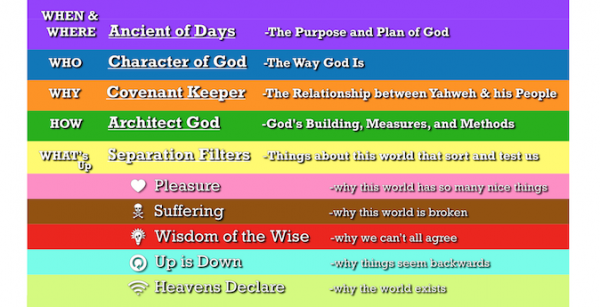It was in Isaiah that I first noted the repeated themes I’ve been showing here on my blog. The message God burdened Isaiah with was the same one every other prophet spoke, and the same message given by Christ and his apostles. The Principles of the Prophets are the themes of the Bible.
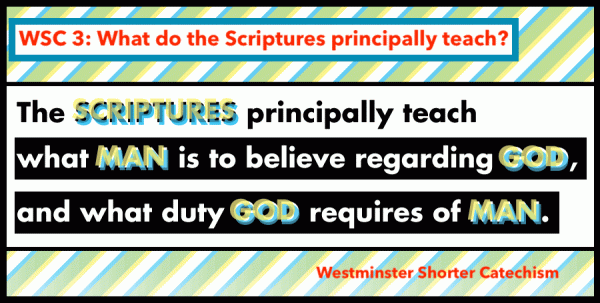
Isaiah by Colored Highlight
Take a look at Isaiah 66. Skimming down below, look at all the colors. Each verse tags one or more of the themes we’ve been discussing, and each color is addressed!
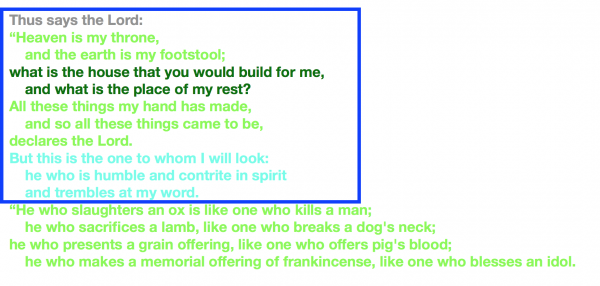
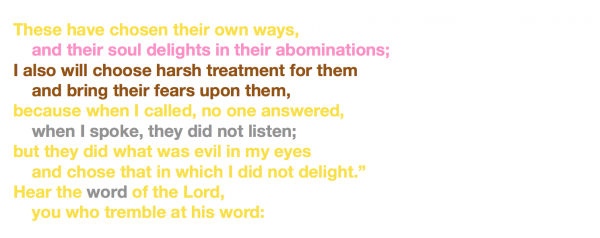
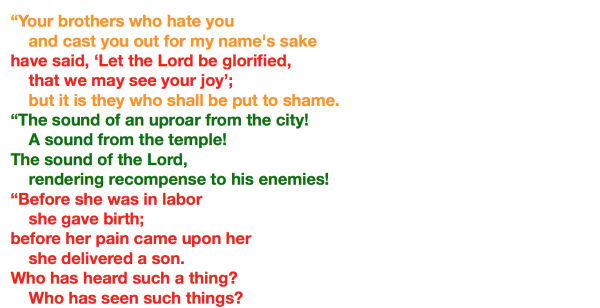
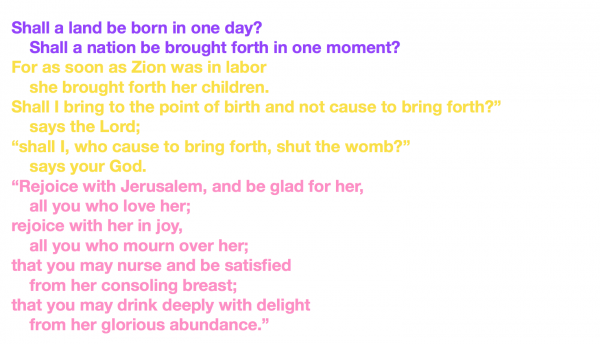
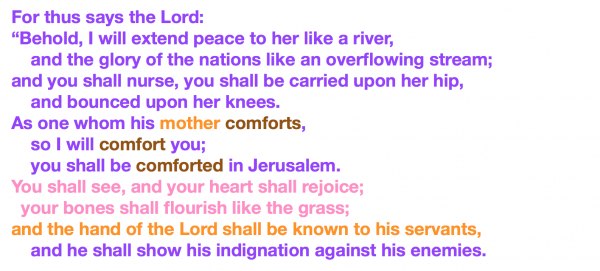






What Does This Mean?
While Isaiah’s message in this chapter is HUGE, and goes into depth on each of the Principles, we will discuss a verse or two under each category to show you how it works. (For a more advanced study, CLICK HERE.)
But as the Book of Isaiah touches on the theme, it builds the concept, giving facets uniquely apropros for the time it was delivered to the world.
The Who of God
![]() Dark Blue: The Character of God
Dark Blue: The Character of God
Who God is and how God is are shown by his self-declarations and his deeds, especially understood through the Bible.
Ex: Heaven is my throne,
and the earth is my footstool;
what is the house that you would build for me,
and what is the place of my rest?
All these things my hand has made,
and so all these things came to be,
declares the LORD.
But this is the one to whom I will look:
he who is humble and contrite in spirit
and trembles at my word (vv1-2).
The whole Bible is filled with a self-revelation of God, and as you see above, while it is substantially telling us the Character of God, it simultaneously taps into Grey/Light Green/Green/Light Blue. This is what makes Isaiah 66 so fundamental for understanding the Principles of the Prophets. The interwoven truths of Scripture: This is who God is and what he requires of man.
The Eternal Plan of the Ancient of Days is found in time words in the Bible: terms like “everlasting,” “for generations,” “age to age” reflect this plan from the beginning.
Ex: For thus says the LORD:
“Behold, I will extend peace to her like a river,
and the glory of the nations like an overflowing stream;
and you shall nurse, you shall be carried upon her hip,
and bounced upon her knees.
As one whom his mother comforts,
so I will comfort you;
you shall be comforted in Jerusalem” (vv.12-13)
“For behold, the LORD will come in fire,
and his chariots like the whirlwind,
to render his anger in fury,
and his rebuke with flames of fire” (v 15).
God’s purpose is single-fold, yet it has many facets. He intends to bring about a New Heavens and a New Earth populated with his people. This world, and all the good and bad we face, is all for this one purpose: “Thy kingdom come, thy will be done, on earth as it is in heaven” ([biblegateway passage=”Matt 6:10″]), see Temple below.
In Isaiah we see God bringing comfort and peace to those who have become His People, and we see him dealing righteously and justly with those who continued in this life to reject Him and his offer of peace.
He weighs and measures our deeds and sets forth the plumb line in conscience and his Word. Green is for the Temple he is building, and the measuring methods he uses to test humanity for membership in that Temple.
Ex: “The sound of an uproar from the city!
A sound from the temple!
The sound of the LORD,
rendering recompense to his enemies!” (v 6).
“For as the new heavens and the new earth
that I make
shall remain before me, says the LORD,
so shall your offspring and your name remain” (v 22).
“For behold, the LORD will come in fire,
and his chariots like the whirlwind,
to render his anger in fury,
and his rebuke with flames of fire.
For by fire will the LORD enter into judgment,
and by his sword, with all flesh;
and those slain by the LORD shall be many” (v 15-16).
Temple: The OT Temple was a shadow of the Temple God would build in his body and the body of Christ. Believers are the temple of God ([biblegateway passage=”1 Cor 6:19″]), as Christ’s body was also the Temple of God ([biblegateway passage=”John 2:19″]). God’s eternal Kingdom will remain forever, when death and rebellion have been destroyed.
Methods: Fire is commonly known to test the quality of metals, like gold. When we see Yahweh as an “unquenchable fire,” we will be pressed into two camps–those who dread and those who love. As his “offspring” ([biblegateway passage=”Acts 17:28″]), “begotten of God” ([biblegateway passage=”John 1:13″]), we have no fear of the fire of God, for Christ has borne our judgment ([biblegateway passage=”Isaiah 53″]). But Yahweh’s flames of rebuke and judgment meet others with a vastly different result ([biblegateway passage=”Rev 6:16″]).
Covenant is both a reflection of the Character of God and a Separation Filter. Yahweh keeps his people under his faithful, loving care, and his people will respond to him likewise in a committed, faithful way ([biblegateway passage=”John 14:15″]). To understand Covenant you must understand ancient Suzerain Treaties.
The Covenant is also a Separation Filter. Professing believers will show their love, in particular in the way they use their time, talents, and life ([biblegateway passage=”Eph 2:10″]). God-haters and atheists are given God’s people in the world as a test, and how they treat the Church reveals their heart toward God.
Ex: GOD: “As one whom his mother comforts,
so I will comfort you;
you shall be comforted in Jerusalem.
You shall see, and your heart shall rejoice;
your bones shall flourish like the grass;
and the hand of the Lord shall be known to his servants,
and he shall show his indignation against his enemies” (v. 13).
LOVERS: Rejoice with Jerusalem, and be glad for her,
all you who love her (v.5)
And from them I will send survivors to the nations, to Tarshish, Pul, and Lud, who draw the bow, to Tubal and Javan, to the coastlands far away, that have not heard my fame or seen my glory. And they shall declare my glory among the nations. And they shall bring all your brothers from all the nations as an offering to the LORD (vv. 19-20).
From new moon to new moon,
and from Sabbath to Sabbath,
all flesh shall come to worship before me,
declares the LORD (v. 23).
HATERS: “Your brothers who hate you
and cast you out for my name’s sake
have said, ‘Let the Lord be glorified,
that we may see your joy’;
but it is they who shall be put to shame” (v. 5).
In the whole counsel of Scripture there are certain undeniable facts:
First, Yahweh is with his people in a unique way. He is their protector and defender, he is their comfort and their joy.
Secondly, people who know Yahweh run to him in times of distress or times of joy, and live in a way that pleases him, the Sabbath or day-of-worship being a unique demonstration of that covenant-commitment.
And thirdly, God’s people become targets to haters because of their status with God ([biblegateway passage=”Isaiah 66:5″ display=”Is 66:5″] & [biblegateway passage=”Ps 53:4″]).
Consequently, God will repay those who touch the “apple of his eye” ([biblegateway passage=”Ps 17:8, Zech 2:8″]). These are the three ways Covenant works: by God, toward God, against God.
All things in nature find their source in the creative mind of God, so all aspects of science and reason are intended to teach us the character and nature of God, often as analogies.
Ex: “Heaven is my throne,
and the earth is my footstool;
what is the house that you would build for me,
and what is the place of my rest?
All these things my hand has made,
and so all these things came to be,
declares the Lord” (vv 1-2a)
“He who slaughters an ox is like one who kills a man;
he who sacrifices a lamb, like one who breaks a dog’s neck;
he who presents a grain offering, like one who offers pig’s blood;
he who makes a memorial offering of frankincense, like one who blesses an idol” (v. 3).
The created order declares the greatness of God. “By his hand” they have been made, and the more we know of the universe the greater we realize God is. Considering nature teaches us about God ([biblegateway passage=”Rom 1:20″]).
Killing a man, breaking a dog’s neck these are things we naturally cringe from, since they are written on our conscience as wrongs. Oxen, lambs, grain and frankincense are nice things that would normally be associated with a good gift. But in these verses we see that the analogies of nature make a strong point as to God’s disgust with offerings without the necessary relationship (see v.2b below)
The only way to know God is by going down. God opposes the proud but gives grace to the humble. He requires humility and repentance, both requiring a submission to the manner God requires.
Ex: “But this is the one to whom I will look:
he who is humble and contrite in spirit
and trembles at my word” (v 2b)
The way to switch from Hater to Lover, from damned to blessed, is by going down. Return, repent, kneel, confess.
Repentance and confession of sins, falling at the feet of God who will judge you and asking for pardon by the blood of Jesus, if it is authentic and lasting, moves you from [biblegateway passage=”1 John 3:14, John 5:24, Rom 6:13″ display=”death to life”].
“Kiss the Son, lest he be angry” ([biblegateway passage=”Ps 2:12″]). This theme is the point of everything. This is why bad things happen to good people and good things happen to bad people.
Each of us is being given a chance, every human who ever lived was given this chance ([biblegateway passage=”Rom 1:18-32″]).
Life gives us this chance, every Separation Filter (see below) gives us this chance to go Down.
The way UP (to God) is DOWN (in humility) and the way DOWN (to hell) is UP (in pride and self-sufficiency).
The Whys of Life
Yellow: Separation Filters
Life sorts people into two groups by their choices, and specific opportunities are given to force that choice, proving what that person is. General Separation Filters are those that clearly differentiate between two groups. Often we see Yellow with another color.
Ex: “‘These have chosen their own ways,
and their soul delights in their abominations;
I also will choose harsh treatment for them
and bring their fears upon them,
because when I called, no one answered,
when I spoke, they did not listen;
but they did what was evil in my eyes
and chose that in which I did not delight.’
Hear the word of the Lord,
you who tremble at his word” (vv 4-5a)
Here two groups are mentioned: those who have chosen their own ways and those who tremble at his word. While there is a heavy reference to Wisdom of the Wise (see below), we see the decisions they are making and the results that are sure to come. On the other hand, we see that God makes a differentiation with those who fear him.
How we answer the big questions and how we weigh the ungodly principles of this world sift us into a self-serving life or a deeper faith and trust of God’s Word.
Ex: “Your brothers who hate you
and cast you out for my name’s sake
have said, ‘Let the Lord be glorified,
that we may see your joy’;
but it is they who shall be put to shame” (v 5b).
Here those mocking God’s people reflect the stunted reasoning of their world. They make fun of God’s Covenant people who hope in God’s glory.But this hostile thought process proves they are no friend of God. In earlier verses, the reference to doing things the way the nations do things, especially with regard to sacrificing to idols, reveals them bending to popular “wisdom” that is not wisdom.
Pink: Pleasure
Good things in this world either pull us away into idolatry or draw us to God as the source of all joy and contentment.
Ex: “These have chosen their own ways,
and their soul delights in their abominations” (v. 3b).
Rejoice with Jerusalem, and be glad for her,
all you who love her;
rejoice with her in joy,
all you who mourn over her;
that you may nurse and be satisfied
from her consoling breast;
that you may drink deeply with delight
from her glorious abundance.”
For thus says the LORD:
“Behold, I will extend peace to her like a river,
and the glory of the nations like an overflowing stream;
and you shall nurse, you shall be carried upon her hip,
and bounced upon her knees.
As one whom his mother comforts,
so I will comfort you;
you shall be comforted in Jerusalem.
You shall see, and your heart shall rejoice;
your bones shall flourish like the grass;
and the hand of the LORD shall be known to his servants,
and he shall show his indignation against his enemies” (vv 10-14).
The first group delights in their abominations, the second group is comforted and flourishes because they are trusting in God, rejoicing with God’s “Jerusalem,” or heavenly kingdom ([biblegateway passage=”Gal 4:26, Heb 12:22″]).
Brown: Suffering
Pain and suffering in this world either push us into an atheistic anger against God or into a deeper trust of his ways.
Ex: “These have chosen their own ways,
and their soul delights in their abominations;
I also will choose harsh treatment for them
and bring their fears upon them” (vv. 3-4).
As one whom his mother comforts,
so I will comfort you;
you shall be comforted in Jerusalem (v 13).
“And they shall go out and look on the dead bodies of the men who have rebelled against me. For their worm shall not die, their fire shall not be quenched, and they shall be an abhorrence to all flesh” (v 24).
The Biggest Big Question is why we have to live in a suffering world. Believers suffer so they can turn to God for comfort.
In Isaiah 65, God repeated the either/or warnings to the nations and to those not following in the Covenant.
In Isaiah 66 we see the end result of their life of bad decisions. We no longer see suffering sifting them anymore. No more chances remain. Instead, we see that suffering they experienced was a message of impending judgment they never took to heart. And this is the last verse of Isaiah.
(For a more advanced study, CLICK HERE.)
All quotes from The Holy Bible: English Standard Version. Wheaton, IL: Crossway Bibles, 2016. Print.


